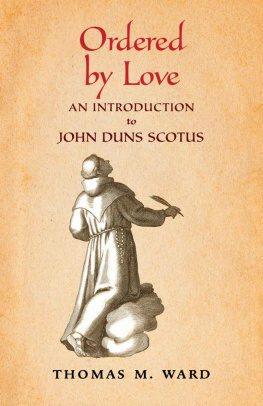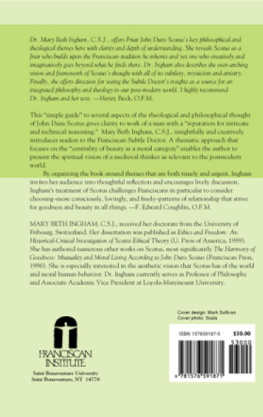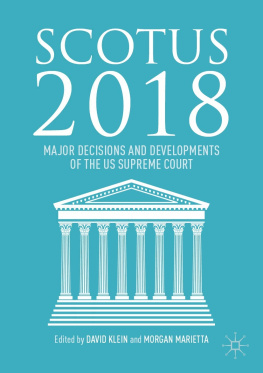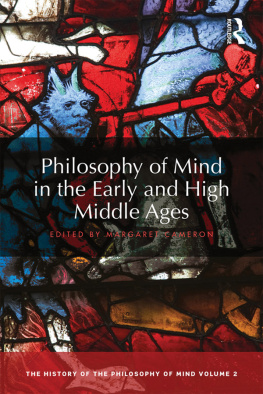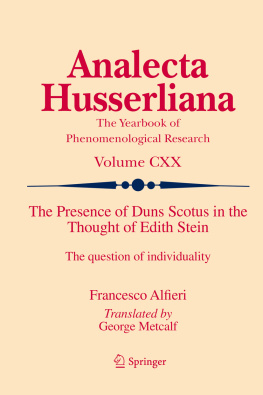THE SINGULAR VOICE OF BEING
MEDIEVAL PHILOSOPHY
Texts and Studies
Gyula Klima, Fordham University
series editor
Richard Cross
Brian Davies
Peter King
Brian Leftow
John Marenbon
Robert Pasnau
Giorgio Pini
Richard Taylor
Jack Zupko
editorial board
THE SINGULAR VOICE OF BEING
John Duns Scotus and Ultimate Difference
ANDREW LAZELLA
FORDHAM UNIVERSITY PRESS
New York 2019
Copyright 2019 Fordham University Press
All rights reserved. No part of this publication may be reproduced, stored in a retrieval system, or transmitted in any form or by any meanselectronic, mechanical, photocopy, recording, or any otherexcept for brief quotations in printed reviews, without the prior permission of the publisher.
Fordham University Press has no responsibility for the persistence or accuracy of URLs for external or third-party Internet websites referred to in this publication and does not guarantee that any content on such websites is, or will remain, accurate or appropriate.
Fordham University Press also publishes its books in a variety of electronic formats. Some content that appears in print may not be available in electronic books.
Visit us online at www.fordhampress.com.
Library of Congress Cataloging-in-Publication Data
Names: LaZella, Andrew, author.
Title: The singular voice of being : John Duns Scotus and ultimate difference / Andrew LaZella.
Description: First edition. | New York, NY : Fordham University Press, 2019. | Series: Medieval philosophy: texts and studies | Includes bibliographical references and index.
Identifiers: LCCN 2018059016 | ISBN 9780823284573 (cloth : alk. paper)
Subjects: LCSH: Duns Scotus, John, approximately 12661308.
Classification: LCC B765.D74 L39 2019 | DDC 189/.4dc23
LC record available at https://lccn.loc.gov/2018059016
Printed in the United States of America
21 20 19 5 4 3 2 1
First edition
CONTENTS
WORKS BY JOHN DUNS SCOTUS
| DPP | De primo principio |
| In librum Porphyrii | Quaestiones in librum Porphyrii Isagoge |
| In Metaph. | Quaestiones super libros Metaphysicorum Aristotelis |
| Lect. | Lectura |
| Ord. | Ordinatio |
| Q. de an. | Quaestiones super secundum et tertium De anima |
| Quod. | Quaestiones Quodlibetales |
| Rep. | Reportatio |
| Super Praed. | Quaestiones super Praedicamenta Aristotelis |
References to standard internal divisions will be made with the following abbreviations: d. = distinction; a. = article; p. = part; q. = question; and n. = paragraph number. For example, Ordinatio I, d. 3, p. 1, q. 3, n. 133.
WORKS BY OTHER AUTHORS
| Thomas Aquinas |
| De ente | De ente et essentia |
| Super De Trin. | Expositio super librum Boethii De Trinitate |
| In Sent. | Scriptum super libros Sententiarum magistri Petri Lombardi |
| Metaphysicorum Aristotelis | In duodecim libros Metaphysicorum Aristotelis expositio |
| SCG | Summa contra Gentiles |
| ST | Summae theologiae; followed by I for First Part; III for First Part of the Second Part; and IIII for Second Part of the Second Part |
| Aristotle |
| Cat. | Categories |
| De anima | On the Soul |
| Metaph. | Metaphysics |
| De Int. | On Interpretation |
| Post. Ana. | Posterior Analytics |
| Top. | Topics |
| Henry of Ghent |
| Quod. | Quodlibeta |
| Summa | Summa (Quaestiones ordinariae) |
| Peter John Olivi |
| In II Sent. | Quaestiones in secundum librum Sententiarum |
| QDDC | Quaestiones de Deo cognoscendo |
| Thomas of Sutton |
| Tract. de esse | Tractatus de esse et essentia |
| QO | Quaestiones ordinariae |
All other abbreviations will be explained in context.
THE SINGULAR VOICE OF BEING
In his relatively late Quodlibetal Questions (dated to Advent 1306 or Lent 1307), John Duns Scotus begins by citing a passage from Ecclesiastes 1:8. All things are difficulty, says Solomon in Ecclesiastes 1 and he explains why he thinks they are difficult. Scotus and Solomon proceed to gloss the passage: Human language is inadequate to explain them. Therefore, the distinction of things can help in classification surrounding these difficult questions. Getting our distinctions straight can alleviate the difficulties humans face in explaining things (res). Equipped with inadequate linguistic and conceptual capacities, humans must undertake great labors in order to classify the world and make distinctions.
This work will investigate how Scotus envisions us wayfarers undertaking this labor of proper division. Such division, it will be shown, requires cutting the univocal concept of being at its joints. Such proper carving must locate what Scotus calls ultimate differences, which are nonthings yet are not nothing. A study of such ultimate differencesan area of Scotuss thought that has been underexploredwill reveal the importance of a nonreified conception of difference for proper division, as well as shedding new light on Scotuss much-misunderstood doctrines of univocity and theory of individuation.
Properly distinguishing and classifying beings stands as a perennial task of philosophy, one by no means unique to Scotus. Amid a career of making such divisions, Plato famously remarks in the Phaedrus: Division must cut being at its joints. But can he find the joints?
The question of division takes center stage in the Sophist, beginning with the question of how we can distinguish between the statesman, the sophist, and the philosopher. To get things started, the Eleatic Stranger and Theaetetus (the dialogues primary interlocutors) construct a network of divisions to define an angler. The angler provides a simple definitional model that can be used for the sophist. Such a network of division casts a net to identify a target. A well-constructed network of divisions, like a well-constructed net, should capture its prey without letting it escape between its nodes. This definition serves to cut being at its joints.
The angler, we learn, is an expert, whose expertise acquires (as opposed to producing) its object by means of actions (not through exchange), who secretly hunts (not openly combats) a living (not lifeless) water (not land) animal and so on. In each case of division, we tread clearly down one side of the binary paths, which ultimately lead us to our target: the angler.
The sophist, however, proves a wilier target. Like the philosopher, one might say, the sophist is also a cleanser of souls. So what distinguishes the sophist from the philosopher? In casting the net of division to capture one of them, we confront a moving target. The sophist has transcategorial being, not remaining within a single node of the net cast upon him or her.
Next page

